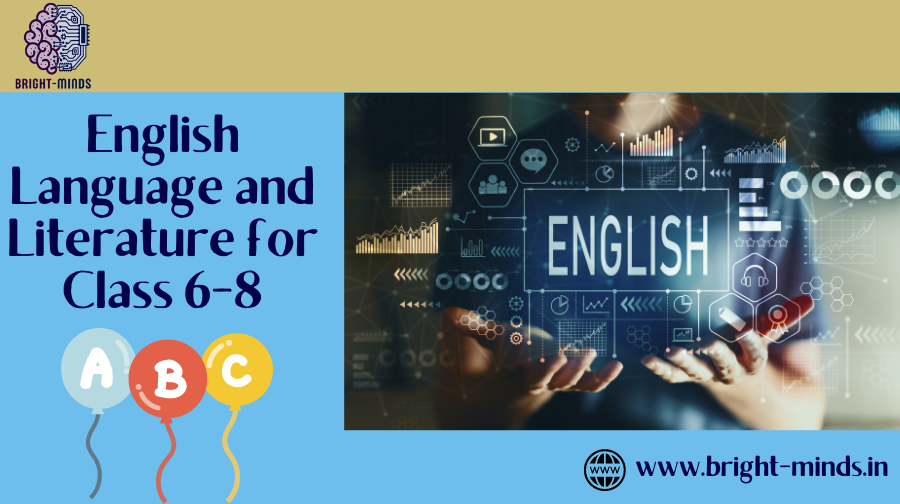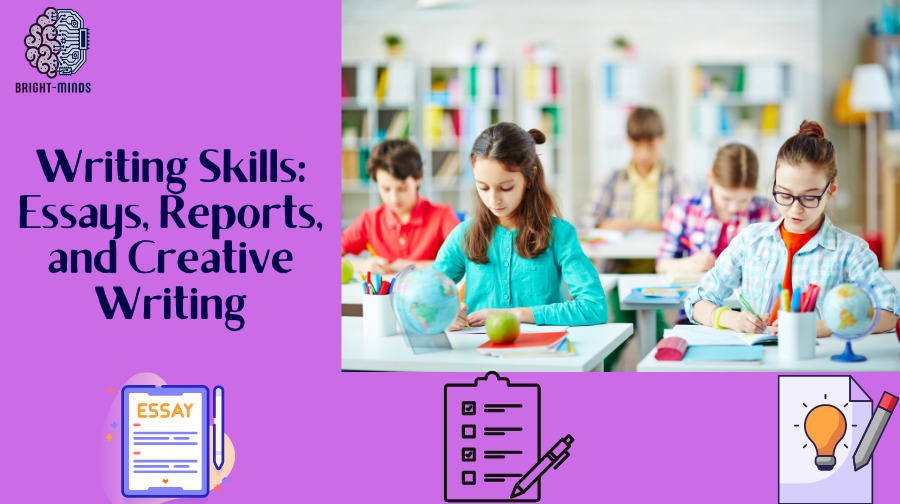
Master English Language with our comprehensive guide for classes 6-8. Learn grammar, literature, and writing skills. Improve your communication and exam scores.
As students progress through their educational journey, developing advanced English language and literature skills becomes crucial. For English Language Class 6-8, the focus shifts towards enhancing vocabulary, grammar, reading comprehension, and literary analysis. This stage lays the foundation for higher-order language skills and fosters a lifelong appreciation for literature. This comprehensive guide delves into the key aspects of English language and literature for this age group, providing educators and parents with insights to support effective learning.
Key Areas of Focus
1. Vocabulary Expansion
Introduction to Advanced Vocabulary
Students in Class 6-8 should be introduced to a broader and more sophisticated vocabulary. This includes synonyms, antonyms, idioms, and phrases that enrich their language skills and comprehension.
Practical Strategies for Vocabulary Building
- Contextual Learning: Encourage students to learn new words within the context of sentences and stories. This helps them understand usage and meaning.
- Word Maps: Utilize word maps to visually organize and connect new vocabulary with related terms and concepts.
- Daily Practice: Incorporate vocabulary exercises into daily routines, such as word-of-the-day activities or vocabulary quizzes.
2. Grammar Proficiency
Understanding Complex Grammar Concepts
Students need to grasp complex grammar rules, including verb tenses, clauses, conjunctions, and sentence structures. Mastery of these concepts is essential for clear and effective communication.
Effective Grammar Instruction
- Interactive Exercises: Use interactive exercises and games to make grammar lessons engaging. Tools like grammar worksheets, quizzes, and online resources can reinforce learning.
- Error Analysis: Encourage students to identify and correct grammatical errors in their writing. This practice helps develop a keen eye for detail and enhances editing skills.
3. Reading Comprehension
Developing Critical Reading Skills
Reading comprehension involves understanding and analyzing texts. Students should be exposed to various genres, including fiction, non-fiction, poetry, and drama.
Techniques for Enhancing Comprehension
- Active Reading: Teach students to use active reading strategies, such as highlighting key points, summarizing paragraphs, and asking questions about the text.
- Discussion and Analysis: Facilitate group discussions and analyses of texts to deepen understanding and encourage critical thinking. Explore themes, characters, and plot developments with students.
4. Literary Analysis
Introduction to Literary Elements
Students should learn to identify and analyze literary elements such as plot, setting, character development, and themes. Understanding these elements enhances their appreciation of literature and improves their analytical skills.
Methods for Teaching Literary Analysis
- Comparative Analysis: Encourage students to compare and contrast different texts or characters. This helps them understand various perspectives and narrative techniques.
- Creative Projects: Incorporate creative projects, such as writing book reviews or creating character diaries, to make literary analysis engaging and relevant.
5. Writing Skills
Improving Writing Proficiency
Writing is a critical component of language development. Students should practice various forms of writing, including narrative, descriptive, persuasive, and expository essays.
Strategies for Effective Writing Instruction
- Writing Workshops: Conduct writing workshops where students can draft, revise, and edit their work. Peer review sessions can provide constructive feedback and enhance writing skills.
- Genre Exploration: Introduce students to different writing genres and styles. This exploration helps them understand the nuances of each type and develop versatility in their writing.
Best Practices for Educators and Parents
1. Foster a Love for Reading
Encourage students to read regularly and explore a wide range of books and genres. Create a reading-friendly environment at home and school to nurture a lifelong love for literature.
2. Integrate Technology
Utilize educational technology tools and resources to support language and literature learning. Interactive apps, online reading platforms, and digital writing tools can enhance engagement and provide additional practice.
3. Encourage Creative Expression
Provide opportunities for students to express their creativity through writing, storytelling, and literary analysis. Creative projects and activities can make learning more enjoyable and meaningful.
4. Provide Constructive Feedback
Offer constructive feedback on students’ work to help them improve their language skills and writing proficiency. Focus on both strengths and areas for improvement, and provide actionable suggestions for growth.
5. Collaborate with Students
Engage students in discussions about their reading and writing experiences. Encourage them to share their thoughts, ideas, and interpretations, and actively listen to their perspectives.
Analyzing Literature: Themes, Characters, and Plot
Understanding Literary Themes
English Language In Class 6-8, students are introduced to the concept of literary themes, which are the underlying messages or central ideas within a piece of literature. Analyzing themes helps students grasp the broader meaning of texts and understand the author’s intent. Common themes explored in this age group include friendship, courage, and the struggle between good and evil. Teachers can encourage students to identify and discuss these themes through guided reading sessions and class discussions.
Character Analysis
Character analysis is another crucial aspect of literature study. Students should learn to examine characters’ traits, motivations, and development throughout the story. Understanding how characters evolve and interact with each other provides insight into the narrative’s complexity. Activities such as character journals, role-playing, and group discussions can help students engage with and analyze characters more effectively.
Plot Structure
Understanding plot structure is essential for comprehending how stories unfold. Students should be familiar with the key components of plot, including exposition, rising action, climax, falling action, and resolution. By mapping out the plot of various stories, students can see how these elements contribute to the overall narrative. Teachers can use graphic organizers and storyboards to help visualize the structure and enhance understanding.
Writing Skills: Essays, Reports, and Creative Writing

Essay Writing
Essay writing is a fundamental skill that students develop during these years. At this stage, students should focus on structuring their essays with clear introductions, body paragraphs, and conclusions. Emphasis should be placed on developing coherent arguments, using evidence to support points, and ensuring proper grammar and punctuation. Practice with various types of essays, including descriptive, narrative, and argumentative, will help students become more proficient writers.
Report Writing
Report writing is another important skill for students to master. Reports typically require a clear, objective presentation of information, which can be drawn from research or observation. Students should learn to organize their reports with headings, subheadings, and bullet points to make the information easily accessible. Teachers can assign projects that involve researching a topic and presenting the findings in a report format to develop these skills.
Creative Writing
Creative writing allows students to express their imagination and creativity. In English Language Class 6-8, students can explore various forms of creative writing, including short stories, poetry, and plays. Encouraging students to write freely and experiment with different genres helps develop their unique voice and writing style. Writing prompts, storytelling exercises, and peer reviews are effective ways to nurture creative writing skills.
Enhancing Reading Comprehension and Critical Thinking
Reading Comprehension Strategies
Effective reading comprehension involves more than just understanding the words on a page; it requires students to engage with the text actively. Strategies such as summarizing, questioning, and making predictions help students better grasp and retain information. Teachers can use guided reading sessions, comprehension questions, and interactive activities to reinforce these strategies.
Critical Thinking
Critical thinking involves analyzing and evaluating information rather than just accepting it at face value. In literature, this means questioning the author’s choices, interpreting symbols, and considering alternative perspectives. Students can develop critical thinking skills through discussions, debates, and analytical essays that encourage them to think deeply about the text and its implications.
Encouraging Independent Reading
Encouraging independent reading is vital for developing both reading comprehension and critical thinking. Providing students with a diverse range of books and allowing them to choose their reading materials fosters a love for reading and supports their growth as independent readers. Book clubs, reading challenges, and book reports can motivate students to explore new genres and authors.
Conclusion
The study of English language and literature for Class 6-8 is a rich and rewarding journey that prepares students for more advanced studies and lifelong learning. By focusing on analyzing literature, developing writing skills, and enhancing reading comprehension and critical thinking, students can build a strong foundation in English Language arts. As educators and parents, it is essential to support and guide students through this process, ensuring they have the tools and confidence to succeed in their literary endeavors. Embrace the opportunities this stage offers to nurture a love for language and literature that will last a lifetime.
you may be interested in this blog here:-
